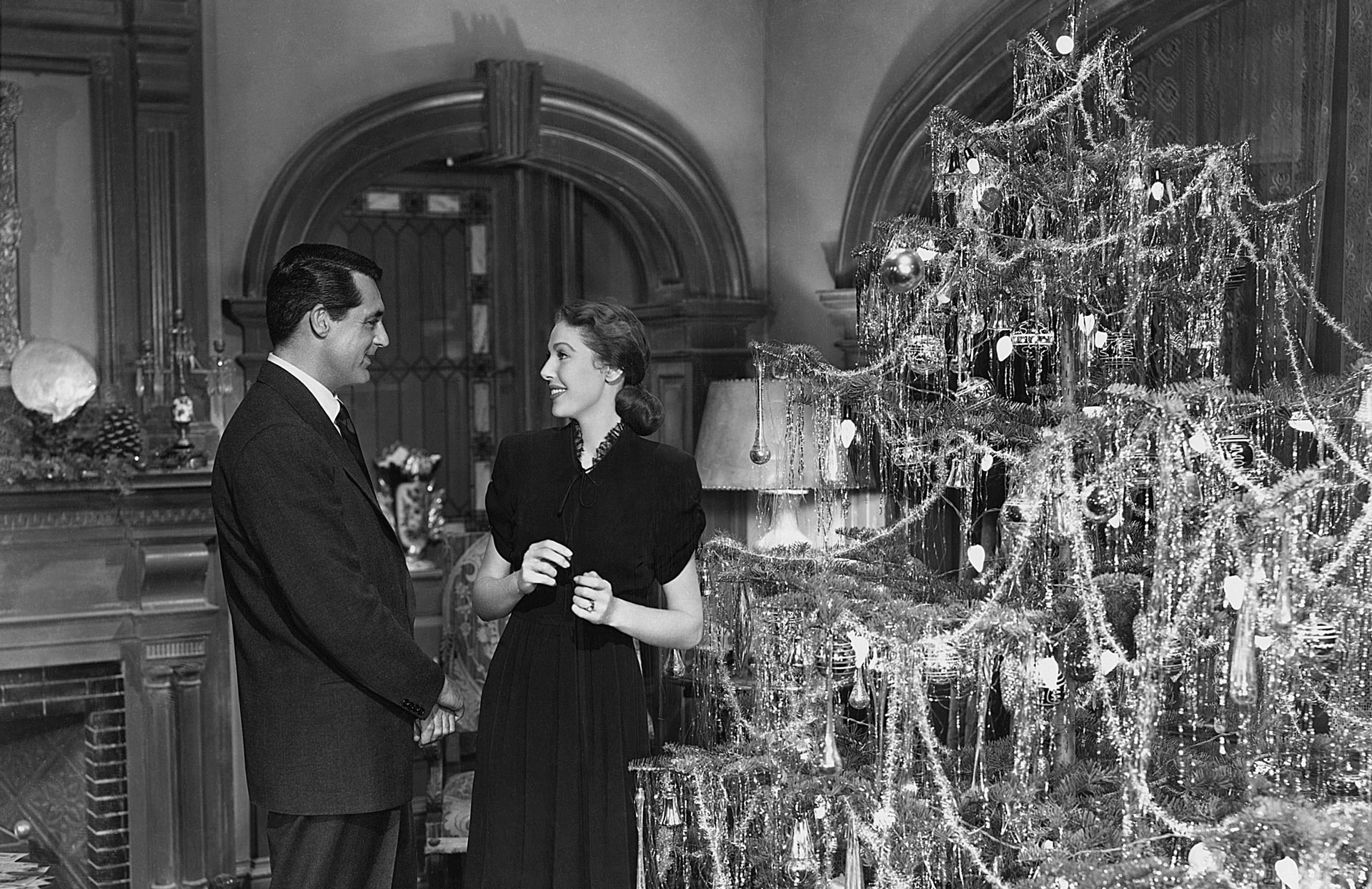I try to write every year on old Christmas movies, and this year I’m doing an entire series on ’40s movies remade in the ’90s, which suggests we can bring back some of those heartwarming stories. So I give you The Bishop’s Wife (1947): a Christian fairy tale typical of ’40s Hollywood, addressed to the entire nation and something we still long for, as the 1996 remake starring Denzel Washington and Whitney Houston suggests. The original recalls the sweeter and funnier parts of Frank Capra movies, and that’s rather high praise.
Genuinely Christian Christmas movies are difficult to make, partly because faith is such a serious matter. Movies cannot do it justice. We mostly keep Christ out of our poetry. We can love poetry or learn from it, but it is not holy. Movies have to obey a certain realism about our lives and do their work by creating plausible images—whereas Christmas is, in the faith, the most miraculous moment. The most movies can do is portray our predicaments and thus get at our faith indirectly.
This is all in The Bishop’s Wife, made by Sam Goldwyn, then a very famous producer, after a ’20s novel. Cary Grant starred, who was a great box office draw, a genuine star—beautiful and out of reach. He plays the angel convincingly. He was not only extraordinarily handsome, which was rare then, but he also had grace of movement and comic timing. What he had never done before was turn beauty to a higher purpose, to suggest divine authority. To judge by the evidence of the movie, this came easily to him.
David Niven, the famous British actor, is the bishop who prays for guidance and receives an angel. He shouldn’t be speaking with an English accent in New York, frankly, but in the ’40s this was tolerated, and we should also extend the same tolerance. Niven’s mannerisms emphasize embarrassment and stiffness, which make his role work so well that you will have no doubt as to the great difference between faith and reputation even in the life of spiritual authorities. He has reached a crisis brought on by his success: A young bishop, deeply devoted to the faith, he has taken on the project of building a cathedral to the greater glory of God, but this involves him in the pride of rich people and the endless organization of details that seem to have no connection to faith and with which he cannot cope. Instead of everyone coming together in faith, it seems like the project is bringing out the worst in people, or at least making them heedless, as though everyone wanted something from God but no one gives a thought to making any sacrifices. This is quite a burden, yet he’s close enough to success that he cannot detach and see the problem clearly, so he prays for guidance.
Niven is shocked by the miraculous answer to his prayer and dares not disbelieve in the appearance of the angel nor avail himself of his faith, which makes for psychological conflict—and gently reveals our own predicament. This is the drama of a good man tempted to ignore the innocent in order to win over the respectable and win his place among them, a problem far harder to deal with in our own time. Moreover, Niven manages to go through the drama almost entirely without harshness, keeping this a family movie. The angel embodies the exhortation to be as prudent as snakes but harmless as doves, so the bishop finds it impossible to trust him: If he is innocent, he’s no help in a wicked world; but if he’s worldly wise, how can he be good? The angel brings into sharp relief the self-doubt and even self-contempt of the man of faith.
The beautiful Loretta Young is the titular wife—they’re Episcopalian so they’ve got something of Catholic authority and hierarchy, but also the emphasis on family and community of independent Protestants. She has to play the public part of a bishop’s wife, all formality and grace, but she cannot help missing their older, smaller parish, before they were important, because they lived a more genuinely loving life as a family and part of a community. Now they’ve got a mansion, a St. Bernard, and a lovely little girl, but it’s making the bishop hard and breaking the wife’s heart. She also reveals the bishop’s moral drama, because she’s always loved him but is unable to help him anymore. He estranges himself from life, because not even marriage seems worth the effort if he cannot prove his faith by bringing his community together.
Christmas is always in danger in Christmas movies—we’d have no reason to make such movies otherwise. But what specifically is in danger about Christmas here? In this case, we have a remarkable concentration of problems in one household: A man’s faith, his family, community, and church government are all tied together. All this is made both better and worse by the presence of an angel. This is as it should be because it preserves human freedom. Choices must still be made.
So we have a fairy tale about miracles! You don’t see that in theaters anymore. The dramatic construction is itself interesting. The angel does not allow the bishop to divulge his presence, as he’s undercover. Why should miracles be invisible? Well, this is merely poetry, trying to show why we’re unprepared for miracles. The angel says the bishop is known to be a good man. Nevertheless, the angel is ready to be met with disbelief, and is not disappointed. We want our lives to be ours; miracles take them away from us. We know miracles require that we change, but we don’t quite know how, and fear the consequences, so often our pride gets in the way.
So we need fairy tales to remind us that change is still possible, and The Bishop’s Wife is just such a funny, lovely Christmas fairy tale. Compared to angels, human beings look childish. People treat the angel with unfeigned wonder, some with suspicion, most don’t even notice. The angel’s explanation points to human self-importance: We want to believe our ideas are always ours, never inspired, so we do not look beyond our small lives. This is not far from the truth about our modern predicament.
The comedic conceit, an undercover angel, turns out to reveal something about our souls and our lives—why no one can accept the angel as an angel or try to investigate who or what he really is. The angel is neither here nor there! Just think of our own meritocracy: Our claim to deserve our success makes it impossible for us to acknowledge miracles, since that would turn us toward gratitude for gifts received rather than pride for victories won. But at Christmas time, gratitude is essential.
Grant’s angel is neither a servant, at the bishop’s beck and call to miraculously sort out all difficulties, nor is he a creature of pure reason. Starting with the bishop’s wife and ending by inspiring a Christmas sermon for everyone, the angel reminds them, and us, that hope is supposed to make people free, and freedom is a precursor of true charity. Various characters reveal our desire for distinction and our fear that we don’t really matter at all, and it takes an angel both to bring out that fear, in the comic guise of pretension, and to assuage it. The angel makes people briefly transparent to themselves and each other, revealing the deep needs of the soul, making it possible for people to see their equality, rich and poor, learned and ignorant, old and young.
This is the Christian core of the story: The angel comes to remind everyone of what Christmas really means and why it’s tied up with gifts. This is because the Christian God is love. This is already suggested when we first see Cary Grant—he looks on people caroling, window-shopping in the streets in the evening, content and at their leisure, but he also keeps a watchful eye and helps a woman, a baby, and a blind man. God wants the needy protected. So there is room for pride, but of a special kind: the pride in helping where we can those who need us. They have a claim on us in Christ, but we have reason to feel proud since we accomplish a good thing, sometimes a difficult one. The mission to care for the poor is a way of affirming God’s love for everyone; the mission to spread joy is the same.
The Bishop’s Wife offers a meditation on Christianity both needful in America and typically American. It avoids preaching and fake piety. A movie is not an act of faith, but it should be part of the lives of faithful Americans and at the same time can be perfectly entertaining for Americans who are not Christians. Happily, there is nothing sordid in the story—only some sentimentality that weakens the third act, without however affecting the resolution.
By the time Sam Goldwyn Jr. remade his father’s film, now called The Preacher’s Wife, with Denzel Washington as the angel and Whitney Houston as the wife, America had changed enough for Hollywood to make movies about black communities, but also to have made it impossible to make movies about a Christian community unless it’s black. Director Penny Marshall introduces a lot more joy from its musical numbers, playing to the strengths of both Houston and the gospel music tradition. In fact, the music is the most enduring part of the film: It was a bestselling soundtrack and secured an Oscar nomination for composer Hans Zimmer.
But the story in the very enjoyable remake is still much impoverished—it’s just a conflict between the small church community and a real estate developer, a mark of the weakness of spiritual life and, in a way, a reduction even of civil rights to materialism. The notion that a man of faith could be so interesting to his fellow Americans was lost. The ’90s had some of the comic innocence of old Hollywood, but not the generous and even ambitious intellectual resources that made for stories that would not only be popular but deserve popularity because they tried to encompass the whole of America. With the collapse of mainline churches into liberal-Progressive politics, Christianity and its core conflicts could no longer be dramatized, and America, still a Christian country, compared to other modern democracies, is poorer for it. Faith is largely absent in public life and almost entirely in art and entertainment. Indeed, if someone remade the story again, it could only be about Catholic immigrants or about trad Christians, and either way it would lack broad appeal.
So watch the original The Bishop’s Wife this Christmas—it will remind you what middlebrow art could achieve in America and that it can be done again. It’s both thoughtful and decent, it reminds us of faith and of the American people, but modestly, without revolutionary demands or enthusiastic delusions. It allows us to be peaceful as we see our own problems with family, community, and faith. In our crazy times, it’s also consoling: America is likely to make it through the turmoil.

